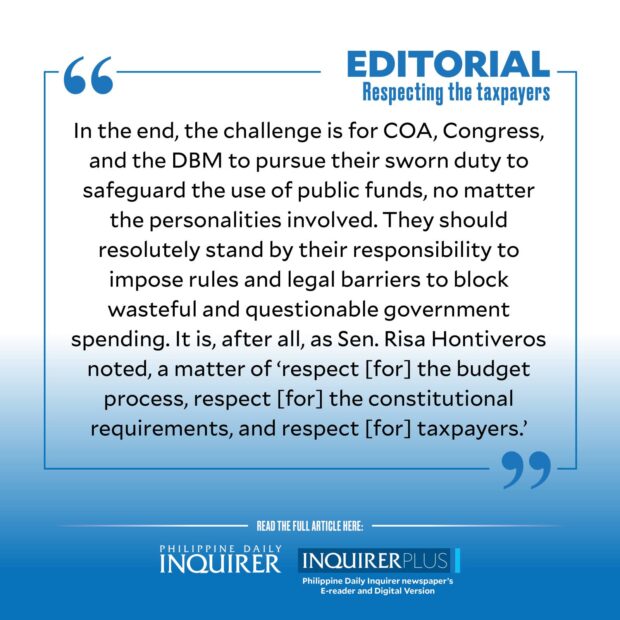Respecting the taxpayers
For Filipino wage earners agonizing over the price-capped cost of rice, it must have come as a shock to learn that a high-ranking government official spent P125 million in confidential funds within 11 days—which translates to about P11.4 million a day—a scandalous outlay that the official has declined to account for.
More appalling still is realizing that the money, being public funds, comes from our taxes, the amount the state painfully squeezes from us for every item we buy, movie we see, and centavo we slave over each day.
Article continues after this advertisementOn Monday, Marikina City Rep. Stella Quimbo disclosed during House deliberations on the 2024 General Appropriations Act (GAA) that the P125 million confidential funds allotted to the Office of Vice President (OVP) Sara Duterte in 2022 was spent within 11 days—not 19 days as previously cited by ACT Teachers Rep. France Castro based on documents from the Department of Budget and Management (DBM).
Earmarked as confidential and intelligence funds (CIF), the amount was transferred from the Office of the President in December 2022, in what critics have slammed as contrary to a 2013 Supreme Court ruling that struck down as unconstitutional any additional funding for projects not included in the original request for appropriation, after the GAA or the national budget has been signed into law. The high court ruling was meant to put the brakes on the congressional pork barrel system that some lawmakers have flagrantly misused.
As opposition lawmaker and Albay Rep. Edcel Lagman pointed out—and rightly so—the original 2022 budget of the OVP crafted under former vice president Leni Robredo did not provide funds for confidential purposes.
Article continues after this advertisementWhile the Commission on Audit (COA) has already issued an audit observation memorandum to the OVP requiring its comment and documentary proof over deficiencies noted in its accounts, issues have also been raised on how this huge allocation for the OVP reflects the government’s skewed priorities: Just what problem was the OVP mandated to address that needed such amount for intelligence alone?
Contrast this to the CIF budget given the Philippine Coast Guard (PCG), which has its hands full protecting the country’s sovereignty in the West Philippine Sea amid aggressive incursions by China’s superior maritime militia, its illegal harvesting of endangered marine resources, and lately, its unlawful installation of floating barriers in Bajo de Masinloc. According to PCG spokesperson Commodore Jay Tarriela, the agency received a total of P118.7 million in CIF for the past 17 years. The PCG’s CIF averaged P400,000 a year from 2006 to 2011, but climbed to P10 million a year from 2013 to 2023, a woefully paltry allocation given the crucial necessity for top-notch intelligence on China’s stealthy moves.
With the Office of the President maintaining the legality of the fund’s transfer to the OVP, and Lagman countering it, the Supreme Court must once and for all clarify its earlier ruling to settle this debate that centers on the judicious use of taxpayer money.
Several national agencies have asked for CIF as well, prompting Quimbo to suggest “possible amendments” on who are really entitled to such allocation that, being confidential and not subject to public scrutiny, could easily become a slush fund. More stringent requirements and stricter COA criteria and reportorial requirements must be part of the condition for approval of such funds, especially for government-owned and -controlled corporations that are seldom taken to task for their fiscal decisions. Surprisingly, there are no sanctions nor penalties imposed on agencies that fail to comply with COA’s reportorial requirements, a systemic lapse that can only encourage the profligate use of government funds.
Worth considering as well is Lagman’s suggestion that CIFs be limited to “appropriate agencies, consistent with their mandate,” a proposal that seems to have been adopted by several political parties and lawmakers who, on Wednesday, said that henceforth, CIFs would be given only to agencies with a national security mandate.
A political shift is apparently happening at the House, with appropriations committee chair and Ako Bicol party list Rep. Elizaldy Co announcing on Wednesday that the House will realign part of Duterte’s P650-million confidential funds for the OVP and the Department of Education to the agencies protecting the West Philippine Sea against Chinese incursions. This is a welcome development but why realign only part and not the entire amount?
In the end, the challenge is for COA, Congress, and the DBM to pursue their sworn duty to safeguard the use of public funds, no matter the personalities involved. They should resolutely stand by their responsibility to impose rules and legal barriers to block wasteful and questionable government spending. It is, after all, as Sen. Risa Hontiveros noted, a matter of “respect [for] the budget process, respect [for] the constitutional requirements, and respect [for] taxpayers.”

















